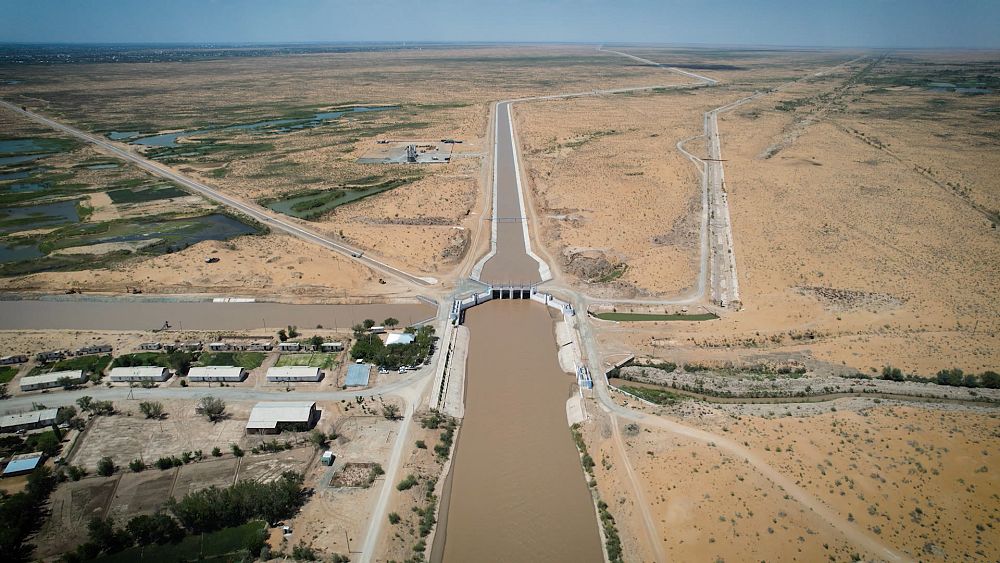
In the episode of Focus, we hear about the steps Uzbekistan is taking to modernise its irrigation system, as the country looks to improve water supply to its agriculture sector and slash carbon emissions.
In South Karakalpakstan, gravity is now being used instead of electric pumps to irrigate the fields. A recent major infrastructure project is also drastically reducing the loss of a major resource – water.
The Bustan Canal is a major water artery. Before its reconstruction, it was an earthen canal, and seepage was a major problem.
“You can see yourself: here are dunes and sands. Around 50% of the water went into the soil,” said project manager Azat Serjanov. “Therefore, we decided to concrete the canal.”
Water enters through the Right Bank Canal from the Tuyamuyun reservoir, which is located on the territory of neighbouring Turkmenistan.
The Bustan Canal is connected by a network of secondary canals. Their total length is more than 800 kilometres, and they’ve all been reconstructed as part of a project which covers three regions and 100 hectares of agricultural land.
“Here we felt an acute shortage of water resources. 35,000 hectares of irrigated land have been taken out of circulation,” revealed Shavkat Khamrayev, the Republic of Uzbekistan’s minister of water resources.
“We concrete canals, reduce seepage losses, increase the efficiency of irrigation systems, and save about 300 million cubic meters of water by reducing losses and putting these agricultural lands back into circulation.”
To reduce water losses, the bottom, as well as the banks of the 70 kilometres-long Bustan Canal, were concreted. Concrete was placed on geomembrane, a special material that helps minimise water seepage.
“The geomembrane is made of high-density polyethylene. It’s 1mm thick and 100% waterproof,” explained project engineer, Bahodir Kulumbetov.
“It is used in hydraulic works as a waterproofing layer under canals, and this helps us save water,” he added.
Previously, electric pumps were used to bring water up to the fields. Now the bottom of the Bustan Canal is raised, so it is higher than the level of the secondary canals and irrigated fields – thus allowing gravity to distribute water. Simply put, it just flows by itself.
This allows the state and the farmers to save around $3 million on electricity annually.
“We are removing more than 400 farm pumps, as well as 20 small and three large pumping stations, which are operated at the expense of the state budget,” Shavkat Khamrayev told Focus. “Thus, we reduce the emission of CO2 greenhouse gases – we reduce 36,000 cubic meters of gas.”
Water gates: Helping farmers cut costs and boost production
We visited a farm that grows fruits in the Ellikalla region, on one of the secondary canals, to see how gravity is used in action.
Farmer Muzafar Saparboyev just has to open this gate when he needs to water his garden.
1600 such water gates have been installed across the secondary canals in South Karakalpakstan.
Muzafar says that his farm has saved €6000 on electricity in one year and explained the benefits of the project.
“The ground on our farm was levelled with a laser as a part of the project, and it allowed us to boost productivity, so our income is increasing,” he said “The speed of the water flow has increased significantly compared to last year.”
Land levelling saves water that would otherwise be wasted in uneven fields, and increases yields.
It is one of the elements of the vast South Karakalpkastan Water Resources Management Improvement project, which also aims to increase the productivity and sustainability of agriculture in this water-scarce region close to the Aral Sea.
The total cost of the project implemented by the government with the support of the World Bank is $374 million.
“The project provided job security to over 38,000 people who are directly working in irrigated agriculture. At the same time, you also have a lot of indirect jobs. Employment, climate adaptation, efficient use of water – it is extremely important and it is within the government and the World Bank strategy,” said Azad Abdulhamid, the Lead Water Resources Management Specialist at the World Bank Office for Uzbekistan.
The strategy of the state is to apply the modernised management of water resources to the whole country, making farming – one of Uzbekistan’s main employment sectors – greener and more resilient to the problems caused by climate change.